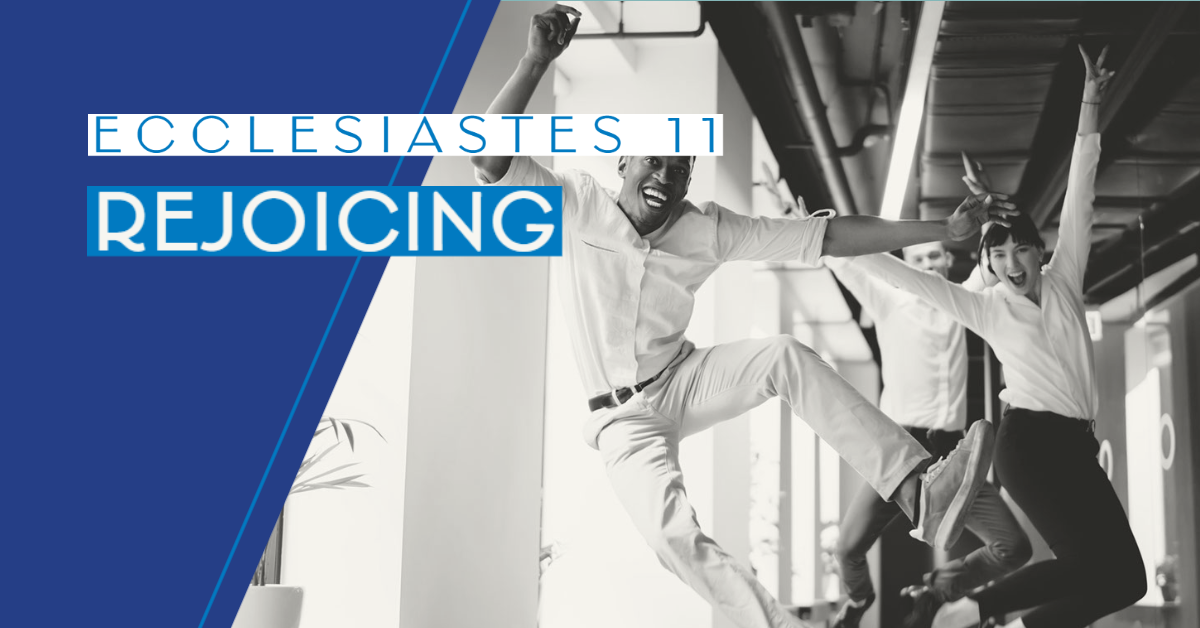
This is part 13 of a many-part blog series on the book of Ecclesiastes.
Life is unpredictable. You can do everything Proverbs suggests and lose your life to a wicked king, a car accident, or a natural disaster. Conversely, you can be wicked and prosper—for now (but not into Eternity). We need to learn to live in the uncertainty of life. We simply cannot know a great many things. The sooner we can accept that truth, the sooner we quit striving after the wind.
Giving or Hoarding?
“Cast your bread upon the waters” (11:1) and “Give a portion to seven, or even to eight,” (11:2a) are advice from Solomon in an uncertain world. We do these things because we “know not what disaster may happen on earth” (11:2b). You truly live more when you give more away than when you hoard for yourself.
The logic seems to be upside down, and it is according to what we have been taught in society—because we are living in an upside-down world. Rather than saying, “You may die tomorrow, so live it up today,” Solomon says, “You may die tomorrow, so give away what you can while you can.”
Why? Solomon doesn’t know. He just knows that it is true. We will come back to this after we wrap up the book. One fantastic way to show least-reached people groups that our hope is in Jesus’ Kingdom is to give things away. The one who hoards displays their hope being fully placed in the “now” – if you cannot give generously, you betray that you really believe there is nothing in the future. When a B4Ter could keep more for herself but doesn’t, she puts the worth of Jesus, rather than the dollar, on display.
Planning in the Uncertainty
If clouds are full of rain, then it will likely rain (11:3). Yet, where I currently live, we regularly have 100% chance of rain and it doesn’t rain. How can they be wrong so often when they are so confident? Because even with the best technology and great minds at work, there is still statistical fluctuation and “randomness” built into the system by God—so that man cannot know what is to come (3:11). Hebel.
“He who observes the wind will not sow, and he who regards the clouds will not reap” (11:4). Isn’t it true? Some try to plan for everything; others throw their hands up in despair, making excuses for everything and doing nothing.
We make plans off the uncertainty, and sometimes they end up looking foolish when the event in question doesn’t come to pass. We have insurance for everything, and there is some wisdom in it for an unpredictable world—but it’s costly.
We dress for sun and it rains, so we begin to over-prepare so we can’t “get caught” anymore. Now we bring too much with us—just in case. Unpredictability can cause a sort of low level, ever-present anxiety that we must fight against.
Murphy’s Law
Murphy’s Law (“If anything can go wrong, it will.”) is a funny but astute observation precisely because of hebel. We cannot prepare for everything, and it’s better to rest than to strive by attempting to prepare for every potential outcome (this is a form of striving after the wind).
We do not “know the work of God who makes everything” (11:5). So what is Solomon suggesting we do about all of this? “If a person lives many years, let him rejoice in them all; but let him remember that the days of darkness are many. All that comes is hebel” (11:8). Rejoice and Remember. Those are the two themes of this chapter and of Solomon’s advice concerning aging and uncertainty.
Rejoicing
Rejoicing is a key for the entire book. It is one of the only tools one had before the Cross to fight hebel. Rejoice, but don’t do so ignorantly. Rejoice while remembering (acknowledging) that the days of darkness will be many.
On the other side of the Cross, we have the unique opportunity to rejoice in suffering. We don’t just rejoice in spite of the days of darkness – we rejoice in them! Romans 5:3-5 says exactly this: we rejoice in the hope of glory (5:2), but not only that – we rejoice in our suffering (5:3)! Aside from being generous without riches, another excellent way to put the worth of Jesus on display is to rejoice in one’s suffering. It’s through our generosity and through our suffering that many will see a hope that is completely independent of our circumstances and the Holy Spirit will use it to awaken them. We can finally see why prosperity is not always a good thing (Ecclesiastes 6:1-6) and why adversity and affliction are not always bad things (Ecclesiastes 7:1-15). Solomon had complained that everyone meets the same fate (Ecclesiastes 9:2-3), so what is the point of it all? The answer from Paul in Romans 5 is that suffering under the sun moves us toward greater endurance –> character –> hope, and our hope will not disappoint us. Amen!
The New Testament offers tools for hope under the sun. Let’s stay put for now and sit in Solomon’s jail of progressive revelation in the 900s BC. Not only is it better for us to understand his context, but the Cross shines all the more brightly when we view it against the surrounding darkness. So it should in our B4Ts.
Greg is the President of OPEN USA. He used his education to work as a tentmaker in the Middle East for 8.5 years seeking to plant a church amongst a least-reached people group. Currently back in the USA with his wife and children, they aim to return to finish what the LORD used them to start.
To learn more about B4T, read Business for Transformation by Patrick Lai.
- Blog Home
- /
- Transformation
- /
- ECCLESIASTES 11: REJOICING
